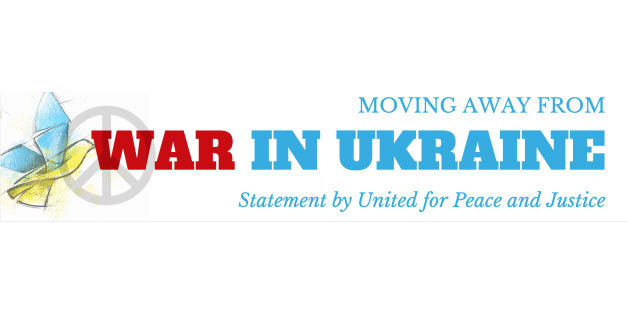Statement by United for Peace and Justice
The Ukraine conflict continues to fester, raising tensions in the region to levels not seen since the Cold War. Now the warring parties have agreed to a ceasefire and an approach to further negotiations towards a political solution. Despite this opportunity to move towards peace, the United States, NATO, and Russia are throwing fuel on the fire. The U.S. is sending troops to Ukraine to train Ukraine’s armed forces, NATO is holding joint military maneuvers from the Baltic to the Black Sea, and Russia is conducting massive exercises of its own that include forward deployment of nuclear-capable missiles and bombers. It’s time for the countries that are providing support from outside Ukraine to halt and reverse all actions that contribute to this war and to the growing confrontation in Europe.
The Ukraine conflict has become a complex proxy war involving four of the world’s five original nuclear armed countries: the United States, Russia, France, and the United Kingdom. The extent of support provided by outside powers remains unclear, obscured by virulent nonstop propaganda campaigns promulgated by all sides. The Ukraine war has also become both a cause and an excuse for the ratcheting up of tensions between the U.S. and its NATO allies and Russia.
In addition to the immediate dangers of war, the climate of confrontation has put further progress towards nuclear disarmament on hold. It also has given the military-industrial complexes on both sides a rationale for the resumption of conventional arms racing and nuclear weapons modernization. The people of the Ukraine are the victims, their country a battleground of competing plutocracies.
The Bulletin of the Atomic Scientists has moved the hands of its Doomsday Clock up to 3 minutes to midnight, citing the existential threats posed by nuclear weapons and climate change.It’s time to step back from the brink. We call on all of the governments involved to take steps to reduce tensions, to lessen the danger of an expanded war, and to provide space and build confidence for negotiations to resolve the Ukraine conflict and the growing confrontation between Russia and the U.S. and its NATO allies. These steps should include:
- No military assistance to Ukraine, whether arms, trainers, advisors, or “nonlethal” aid;
- Unconditional humanitarian assistance directed to ordinary people in all of Ukraine’s regions, sustaining social benefits and public services and aiding in reconstruction of housing and public infrastructure;
- Diplomatic initiatives to encourage Ukrainians engaged in the conflict to enter into good faith negotiations in an effort to reach a political resolution;
- No additional deployments of U.S. forces, equipment, or supplies to Europe;
- Reversal of NATO decisions to expand rapid reaction forces and supporting infrastructure in Eastern Europe, and particularly in states on Russia’s borders;
- Termination of U.S. programs to deploy U.S. ballistic missile defenses in Europe;
- A moratorium on military exercises by all parties in and around Ukraine and European states bordering Russia;
- A moratorium on exercises and tests of nuclear-armed forces world-wide;
- Immediate removal of U.S. nuclear weapons from Europe; and
In this 70th year since the U.S. atomic bombings of Hiroshima and Nagasaki and 45 years after the U.S., Russia, and the U.K. committed in the Nuclear Nonproliferation Treaty to negotiate in good faith for an end of the nuclear arms race and the elimination of nuclear arsenals, immediate commencement of negotiations encompassing all nuclear-armed states for the elimination of nuclear weapons.






